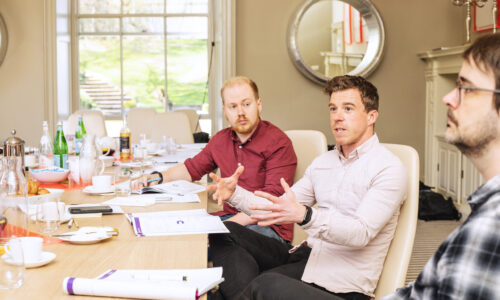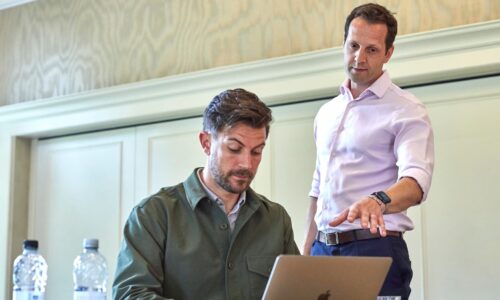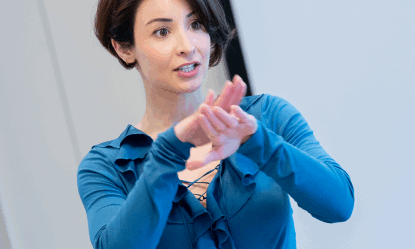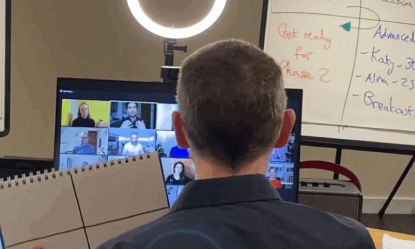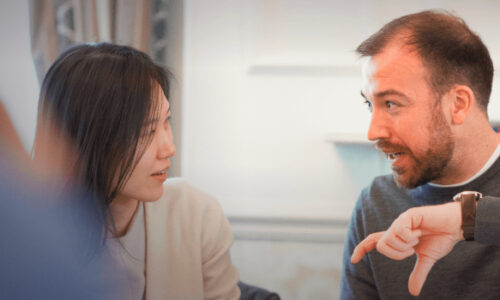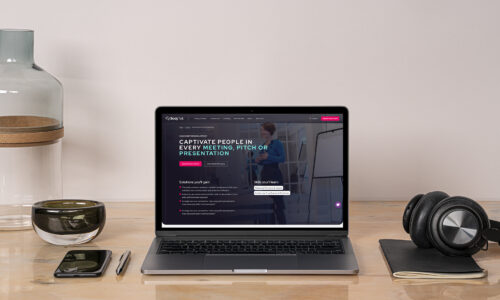“The paradox of excellence is built on the foundations of necessary failure”
How To Apply The Mindset Of An Olympian To Your Presentations
It’s easy to gaze in awe and wonder when watching the Olympic Games.
If there’s an event that displays the feats of human capability, courage and strength, the Olympics is it. We’re so captivated by it, more than three billion people across the globe tuned in to watch Tokyo 2020!
The 2022 Winter Olympics started in Beijing on 4th February.
Olympians train for years for what comes down to one single moment that can last minutes or even seconds. Mental preparation is as essential as physical training to achieve their best under extreme pressure.
Peak performance mindset
You don’t have to be an Olympic athlete to train your mind to deal with moments of pressure when you’re in the spotlight.
Whether you’re chairing a meeting, giving a presentation or speaking in front of a large audience, training your mind can help you overcome nerves and feel more confident.
Developing a peak performance mindset allows you to perform at your best when you need to. You can train yourself to not only survive stressful situations but to thrive and achieve extraordinary results.
Here are some tips from three Olympic athletes that can help you develop a positive mindset for peak performance.
Talent takes practice
Matthew Syed is a former UK table tennis champion who competed for Great Britain in the Olympic Games in Barcelona in 1992 and Sydney in 2000. His mantra is that “talent takes practice”.
In his book Bounce: The myth of talent and the power of practice, he argues that what is often perceived as ‘talent’ in the sporting world is actually down to purposeful practice with the right tools and training. He believes that hard, smart work and perseverance will ultimately lead to success.
The same is true for public speaking. People often feel they’re not ‘naturally talented’ at speaking in front of audiences and use this as an excuse to avoid presenting altogether, or for what they feel will be a poor performance.
It doesn’t have to be that way. Take time to practice your delivery as much as you can, and when you do, try to visualise what a successful presentation will look like: how will you feel, what will you say, how will your audience react? Adopting a positive mindset during practice will help you perform well on the day.
Syed also believes mistakes are crucial to success in any area. Suppose you have a presentation that goes badly. In that case, you may feel awkward or embarrassed – but accepting that you’ll have bad days on your journey can be immensely liberating.
In Syed’s own words: “The paradox of excellence is built on the foundations of necessary failure”.
Take the risk and commit to practising!
Confidence grows slowly
Rower Annie Vernon won a silver medal at the Beijing 2008 Olympic games. She was a full-time athlete for eight years, winning gold in the 2007 and 2010 World Championships.
In her book ‘Mind Games’, she addresses the subject of confidence. “We seem to think you’ve either got it or you haven’t.”
“My definition of confidence is that it’s about having a deep-seated belief that you’re good enough. You’re not perfect of the complete article by any means, but you have the potential and the capacity to deliver to the right level, on the day.”
Confidence doesn’t appear overnight, but if you start to make a note of when things have gone right, you can begin to build up a body of evidence of your successes.
Think about when things have gone well for you, even the smallest of successes. How did you feel? Bank these feelings so that if you’re nervous in the future, you can remind yourself that you’ve aced situations like this before. As you develop confidence in certain situations, you’ll eventually be able to bolster your resilience and use your positive mindset to help you feel confident in any situation.
As Vernon says: “When it comes to confidence, are any of us ever the finished product? It’s a process, a journey to self-awareness; self consciously scaffolding your confidence to enable you to perform and weathering setbacks along the way.”
Forget comparison and run your own race
Eddie ‘The Eagle’ Edwards was Britain’s first-ever ski jumper to compete at a Winter Olympic Games. Despite finishing last in the 70m and 90m ski jump events in Calgary 1988, he became famous worldwide for his determination, spirit and passion for representing his country.
Edwards has spoken about his desire to compete, despite knowing that he was likely to come last.
“For me, getting to those Olympic Games was my gold medal”.
This attitude has made Eddie the Eagle an inspiration to many people. It did not matter that he was not the best, but on the day, his self-belief and performance mindset enabled him to live out his dream of becoming an Olympian.
At the closing ceremony of the 1988 Calgary Winter Olympics, the President of the IOOC, Frank King, referred to Eddie by saying “At these games, some competitors have won gold, some have broken records and some of you have even soared like an eagle.”
Comparing ourselves to others can put huge limits on our own capabilities. We can hold ourselves back unnecessarily out of fear of not being ‘good enough’.
Getting over this fear of comparison, adopting a performance mindset and permitting yourself to take a risk can help you unlock the capabilities you hold.
Lessons from the Olympics
When you’re next preparing for an important meeting, event or presentation, adopt the attitude of an Olympian. Practice well and focus your attention on the positives to prepare yourself to perform at your best on the day.
Working on developing a peak performance mindset will help you build confidence and self-belief and help you to deal better with setbacks.
If you’d like to learn more about how you can develop a peak performance mindset, get in contact with our team today.







